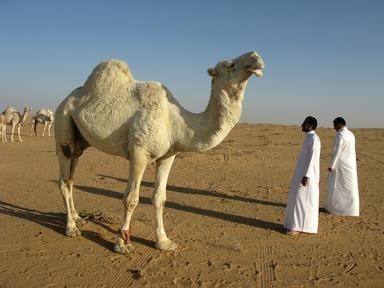With a land area of about 2,150,000 km² (830,000 sq mi), Saudi Arabia is the
country in Asia, and the world's
sovereign nation. It is also the largest country in the
. Its borders, however, are not clearly defined, so its exact size is an approximation. Located in the Arabian Peninsula, Saudi Arabia has land borders with
, Iraq, Kuwait, the
, Qatar, Oman and Yemen; it is also connected to the island country of
in the
by the King Fahd Causeway.
According to the Köppen classification, most of Saudi Arabia has a
climate. with very little precipitation. Summer temperatures are blistering, easily reaching highs of 50 °C (122 °F) and over. One of the country's main geographical features is the absence of permanent
, though non-permanent ones known as
are numerous. The vast Rub' al Khali, or
, the world's largest contiguous
, covers much of the southeastern part of the country.
With its five terrestrial ecoregions, Saudi Arabia is home to a wide variety of wildlife, much of it native to the Arabian Peninsula. The critically endangered Arabian
- the smallest subspecies of this beautiful predator - is still found in the
of the southwest, while the iconic, almost pure white Arabian
, previously hunted to extinction, has been successfully reintroduced in the wild.
Because of its geographical peculiarities, Saudi Arabia is a sparsely populated country, with about 85% of its population concentrated in its urban areas. Over 38% of the population consists of
, mostly from Africa and other parts of Asia. The country's capital,
, is the largest city in the Arabian Peninsula; other major cities are the port of
on the
, and the holy cities of Mecca and
. Though much of the Saudi Arabian economy still hinges on its huge oil and natural gas reserves, leisure tourism is quickly gaining importance as a source of revenue.
